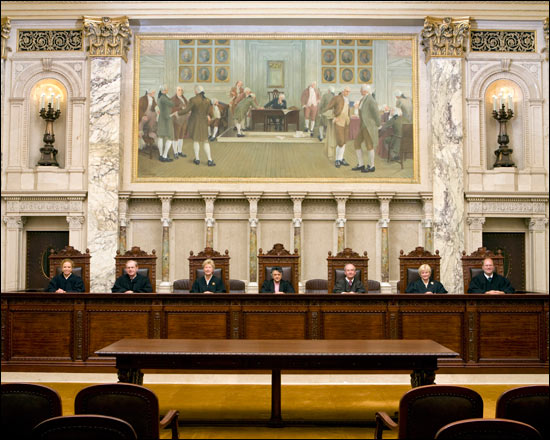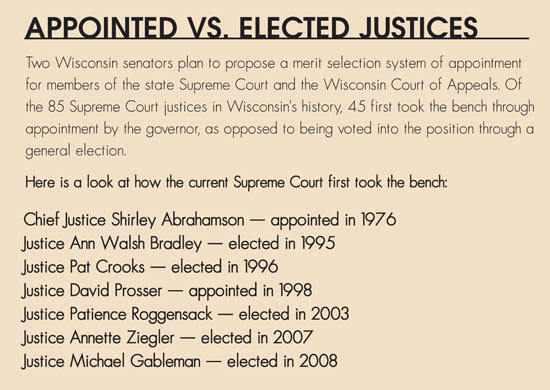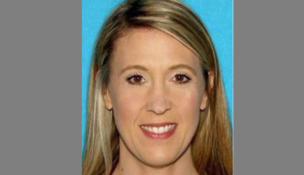Justices by appointment only?
By: Jack Zemlicka, [email protected]//July 8, 2011//
The state Supreme Court election process is not perfect, Justice Patience Roggensack said, but it’s not worth abandoning as a result of recent bickering amongst the court.
Two state Senators are planning to propose a major change to the way justices are selected, however. Sens. Tim Cullen, D-Janesville, and Dale Schultz, R-Richland Center, plan to introduce legislation in September that would ditch the election of justices and replace that system with an appointment process based on merit.
The system could potentially involve a review of applicants by a panel and submission of finalists to the governor, Cullen said.
The timing is right to pitch the plan, he said, on the heels of the ongoing investigation into Justice Ann Walsh Bradley’s allegation that Justice David Prosser tried to choke her during an argument in her state Capitol office June 13, the day before the court handed down a decision upholding a new law that eliminates most public employees’ collective bargaining rights.
Prosser has denied the allegations. On June 24, the Wisconsin Judicial Commission authorized an investigation of the incident.
“That probably doesn’t hurt our argument,” Cullen said of the incident. “The big thing is the public is focused on the court and if they are talking about it, it’s a good idea to get (the proposed switch) out there now.”
But the internal quarrelling amongst members of the court has nothing to do with how they got on the bench, Roggensack said, and a change from elections to appointments is not the medicine that will cure the court.
“I view our court as having a problem,” she said. “But don’t take the vote away from people to solve the problem. It’s not the people that need to be retrained.”
Roggensack said the recent allegations and subsequent investigation are “damaging” to the court’s image, but that should not be tied to the election versus appointment argument.
“I could just cry over what it has done to the court as an institution,” she said. “But it is much more than any one or two justices.”
Roggensack said she doesn’t know what the solution is, but absent any indication that the current court can allay public concerns regarding its impartiality and its inability to work together, some suggested that appointments based on merit selection are the only way to ensure quality control on the bench.
Madison attorney Tom Basting, a staunch supporter of an appointed judiciary, said elections dating back to 2007, combined with recent squabbling, have called into question whether some justices are qualified to serve on the state’s highest court.
“I think some of them are highly qualified justices,” he said. “Others are nothing more than politicians with black robes.”
Basting suggested that merit selection, as used in some form in 28 other states, attracts a higher caliber of candidate because the process eliminates third-party interest groups from investing in the outcome.
In turn, appointments also erase the perception that elected justices are somehow obligated to repay substantial campaign donors in the courtroom, he said.
As it stands, the 2011-13 state budget weakened laws that regulate interest group spending by dismantling the public financing option for Supreme Court candidates and increasing private donation limits from $1,000 to $10,000.
“We’ve got the potential once again that people who run for the court can get substantial financial backing from future litigants,” Basting said.
But Mike McCabe, executive director of the Wisconsin Democracy Campaign, a state election watchdog group, said legislators are wasting their time trying to change the way justices are selected in Wisconsin.
McCabe said he doubts the proposal will pass the Legislature or be approved by voters. Efforts would be better spent on restoring regulation of third-party spending in elections, he said.
“It won’t take any longer than a push for a constitutional amendment,” McCabe said. “To blame the constitution and voters for what has gone haywire with the Supreme Court is misplacing blame and shirking responsibility.”
The next justice up for election is Roggensack, whose term expires July 31, 2013.
Switching to an appointment process by then isn’t possible, given that a shift away from elections requires a constitutional amendment approved through two sessions of the Legislature and the voting public.
But if the senators’ planned proposal moves along, Cullen said, it could be in place for the spring 2015 election, which would feature candidates for Justice Pat Crooks’ seat.
Wisconsin Appellate Court Judge Richard Brown, who favors appointments, said it’s possible that a switch to merit-based appointments could eventually lead to all seven current justices being cycled off the court.
“People who love the law and who don’t love politics; that’s the kind of person I would like to see on the bench,” he said. “I submit to you that is not the kind of person on the bench today.”
Roggensack argued the current system is no more political than an appointment process, however.
In fact, absent the ability to campaign and connect with voters, Roggensack said, she probably wouldn’t be on the bench.
“I was never affiliated with anything political before I ran,” she said. “If I couldn’t have run, I never would have been appointed because I don’t have the connections.”
Jack Zemlicka can be reached at [email protected].
Legal News
- Milwaukee’s Common Council now has the most African Americans, women and openly LGBTQ members ever
- Office of School Safety Provides Behavioral and Threat Assessment Management Training Ahead of 25th Anniversary of Columbine Shooting
- Wisconsin Supreme Court to hear arguments in Democratic governor’s suit against GOP-led Legislature
- Lawsuit asks Wisconsin Supreme Court to strike down governor’s 400-year veto
- Wisconsin man pleads not guilty to neglect in disappearance of boy
- ACS Selects University of Wisconsin Law School’s Miriam Seifter for 2024 Ruth Bader Ginsburg Scholar Award
- People with disabilities sue in Wisconsin over lack of electronic absentee ballots
- Wisconsin Republicans ignore governor’s call to spend $125M to combat ‘forever chemicals’
- Native American voices are finally factoring into energy projects
- Steven Avery prosecutor Ken Kratz admits ‘mistakes were made’
- Colombian national extradited to Milwaukee faces International narcotics-trafficking conspiracy charge
- MPD: Milwaukee homicides down nearly 40 percent compared to last year
WLJ People
- Power 30 Personal Injury Attorneys – Russell Nicolet
- Power 30 Personal Injury Attorneys – Benjamin Nicolet
- Power 30 Personal Injury Attorneys – Dustin T. Woehl
- Power 30 Personal Injury Attorneys – Katherine Metzger
- Power 30 Personal Injury Attorneys – Joseph Ryan
- Power 30 Personal Injury Attorneys – James M. Ryan
- Power 30 Personal Injury Attorneys – Dana Wachs
- Power 30 Personal Injury Attorneys – Mark L. Thomsen
- Power 30 Personal Injury Attorneys – Matthew Lein
- Power 30 Personal Injury Attorneys – Jeffrey A. Pitman
- Power 30 Personal Injury Attorneys – William Pemberton
- Power 30 Personal Injury Attorneys – Howard S. Sicula













